
LymphoSign Journal-The Journal of Inherited Immune Disorders
Scope & Guideline
Pioneering Research for a Healthier Tomorrow
Introduction
Aims and Scopes
- Primary Immunodeficiencies:
The journal emphasizes research on various primary immunodeficiencies, including their genetic underpinnings, clinical manifestations, and management strategies. - Genetic Mutations and Variants:
A significant focus is on identifying novel genetic mutations associated with immune disorders, contributing to the understanding of disease mechanisms and potential therapeutic targets. - Clinical Outcomes and Management:
Research on clinical outcomes in patients with inherited immune disorders, including treatment responses and management protocols, is a core area of interest. - Neurodevelopmental Impacts:
Exploration of the neurodevelopmental aspects associated with immune disorders, understanding how these conditions affect cognitive and physical development. - Public Health and Epidemiology:
The journal addresses broader public health implications, including the impact of infectious diseases like COVID-19 on individuals with immune deficiencies. - Patient Perspectives and Resources:
It also highlights the importance of patient perspectives, data sharing, and resources for individuals affected by primary immunodeficiency.
Trending and Emerging
- Impact of COVID-19 on Immunodeficiency:
There is a notable trend in exploring the effects of COVID-19 on patients with primary immunodeficiencies, including treatment responses and long-term outcomes. - Novel Genetic Discoveries:
The identification of novel genetic mutations and variants is increasingly emphasized, showcasing the journal's commitment to advancing genetic research in immune disorders. - Multisystem Inflammatory Syndromes:
Research on multisystem inflammatory syndromes, particularly in the context of COVID-19, has emerged as a significant theme, reflecting its relevance in pediatric and adult populations. - Patient-Centric Research:
The journal is increasingly focusing on perspectives from patients and families affected by primary immunodeficiencies, highlighting the importance of community engagement and support. - Algorithm Development for Screening and Management:
Recent publications indicate a trend towards developing algorithms for newborn screening and management of severe combined immunodeficiency, aiming for early detection and intervention.
Declining or Waning
- General Immunodeficiency Discussions:
Broad discussions on immunodeficiencies that do not focus on specific conditions or genetic mutations have become less frequent, as the journal narrows its focus towards more defined topics. - Viral Infections and Immunodeficiency:
Research specifically linking viral infections (other than COVID-19) with primary immunodeficiencies has seen a decrease, possibly due to the overwhelming focus on COVID-19 related studies. - Traditional Treatment Protocols:
Publications centered on established treatment protocols for immunodeficiencies have waned, as newer, innovative approaches and personalized medicine gain traction.
Similar Journals

ASIAN PACIFIC JOURNAL OF ALLERGY AND IMMUNOLOGY
Illuminating the complexities of allergy and immunology.The ASIAN PACIFIC JOURNAL OF ALLERGY AND IMMUNOLOGY, published by the Allergy Immunology Society of Thailand, is a pivotal platform for disseminating high-quality research in the fields of allergy and immunology. Established in 1983, this journal has consistently evolved to address the pressing challenges and advancements in these dynamic disciplines, contributing significantly to the global scientific community's understanding of immunological disorders. With a category ranking of Q3 in Immunology and Allergy, and Q2 in Medicine (miscellaneous) for 2023, the journal stands at the forefront of impactful research, engaging with a diverse audience of researchers, clinicians, and students alike. Although it operates on a non-open access model, its rigorous peer-review process ensures that published articles meet the highest academic standards. Located in Bangkok, Thailand, the journal connects researchers across the Asia-Pacific region, fostering collaboration and innovation to enhance patient care in the realm of allergy and immunology.

JOURNAL OF MEDICAL GENETICS
Exploring the Intersection of Genetics and Medicine.JOURNAL OF MEDICAL GENETICS, published by the BMJ PUBLISHING GROUP, stands as a premier platform in the field of genetics, focusing on both fundamental genetic research and its clinical applications. With a distinctive legacy dating back to 1965 and a significant role in advancing the understanding of genetic disorders, this journal has established itself in the top tiers with a commendable Q1 category ranking in both Genetics and Clinical Genetics as of 2023. The journal's impact is underscored by its Scopus rankings, placing it among the leading journals in the fields of medicine and genetics. Researchers and practitioners are drawn to its rigorous peer-review process and its commitment to disseminating high-quality research findings, critical reviews, and innovative clinical practices. While it is not an open-access journal, the insights provided are invaluable for anyone looking to deepen their knowledge or contribute to the burgeoning field of medical genetics.

EUROPEAN JOURNAL OF HUMAN GENETICS
Fostering Collaboration in Human Genetic StudiesThe EUROPEAN JOURNAL OF HUMAN GENETICS, published by SpringerNature, stands as a preeminent platform in the field of genetics and clinical genetics. Established in 1993, this prestigious journal, with an ISSN of 1018-4813 and an E-ISSN of 1476-5438, has consistently maintained its position in the Q1 quartile for both Genetics and Clinical Genetics categories as of 2023, reflecting its significant contributions to the field. Its impact is further underscored by its impressive Scopus rankings, placing it in the 92nd percentile among clinical genetics journals. The journal aims to disseminate cutting-edge research, case studies, and reviews that advance our understanding of human genetics, promoting collaboration and innovation among researchers, professionals, and students alike. While it does not currently offer open access, the journal provides substantial value through its rigorous peer review process and commitment to quality. As it continues to shape the future of genetic research through 2024 and beyond, the EUROPEAN JOURNAL OF HUMAN GENETICS remains an essential resource for those dedicated to exploring the complexities of human heredity.
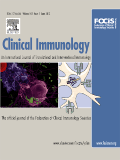
CLINICAL IMMUNOLOGY
Pioneering Insights in Immunology and AllergyCLINICAL IMMUNOLOGY is a premier academic journal dedicated to the field of immunology, published by Academic Press Inc. Elsevier Science. With a robust impact reflected in its recent categorization as Q2 in Immunology and Q1 in Immunology and Allergy for 2023, this journal stands out as a key resource for researchers and professionals alike. Featuring a diverse array of articles from fundamental laboratory studies to advanced clinical applications, CLINICAL IMMUNOLOGY aims to disseminate significant research findings that contribute to the evolving landscape of immunological science. Its notable Scopus rankings underscore its esteemed position, with ranks of #33 and #36 in the respective categories, highlighting its commitment to high-quality scholarly work. Although not an open-access journal, it ensures access to valuable insights and developments in the immune response and related fields, making it an indispensable tool for students and professionals aiming to stay at the forefront of immunological research.
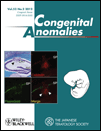
CONGENITAL ANOMALIES
Empowering professionals with vital research.CONGENITAL ANOMALIES is a notable journal published by WILEY, dedicated to advancing the understanding of congenital disorders and anomalies through high-quality research and clinical insights. With an ISSN of 0914-3505 and an E-ISSN of 1741-4520, this journal has been a key resource for professionals in the fields of pediatrics, embryology, and developmental biology since its inception in 1973, although coverage discontinued in Scopus after 2019 due to evolving standards in publication. The journal is ranked in the 48th percentile in the domain of pediatrics, as well as in the 26th and 14th percentiles respectively for embryology and developmental biology, placing it among respected publications in its category. Although it does not currently offer open access options, its contributions remain vital for researchers, healthcare professionals, and students seeking up-to-date information on congenital anomalies, their origins, and potential interventions. With a commitment to fostering knowledge in this critical area of health science, CONGENITAL ANOMALIES continues to play an important role in the intersection of scientific research and clinical practice.

Molecular Genetics & Genomic Medicine
Transforming discoveries into clinical applications.Molecular Genetics & Genomic Medicine, published by WILEY, is an esteemed and open-access journal that has been a prominent source of knowledge in the fields of genetics and molecular biology since its establishment in 2013. With an ISSN of 2324-9269, it aims to provide a platform for the dissemination of novel findings and innovative research that pushes the boundaries of genomics and its clinical applications. The journal holds a Q3 categorization in Genetics, Clinical Genetics, and Molecular Biology, reflecting its growing influence in these disciplines, as evidenced by its Scopus rankings. Researchers, professionals, and students alike will find valuable insights and advancements in genomic medicine, making this journal an essential resource for those dedicated to the understanding and application of genetic and molecular research in healthcare. Located at 111 River St, Hoboken, NJ, Molecular Genetics & Genomic Medicine continues to foster a global dialogue within the scientific community, ensuring accessible knowledge for all.
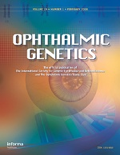
OPHTHALMIC GENETICS
Connecting Genetic Insights to Clinical Eye CareOPHTHALMIC GENETICS is a distinguished journal published by TAYLOR & FRANCIS INC, specializing in the intersection of genetics and ophthalmology. Established in 1981, the journal has become a vital resource for researchers, clinicians, and students interested in the genetic aspects of eye diseases and disorders. Despite not being an Open Access journal, it maintains a commendable impact within the academic community, as reflected by its Q3 ranking in clinical genetics and Q2 rankings in both ophthalmology and pediatrics in 2023. With a robust focus on clinical applications, OPHTHALMIC GENETICS aims to provide a platform for innovative research and insights that drive advancements in patient care and understanding of genetic conditions affecting vision. The journal's international readership is supported by its timely publication of articles that bridge the gap between genetic research and practical ophthalmological applications.
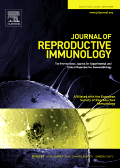
JOURNAL OF REPRODUCTIVE IMMUNOLOGY
Championing discoveries in reproductive immunology.The JOURNAL OF REPRODUCTIVE IMMUNOLOGY, published by Elsevier Ireland Ltd, stands as a pivotal platform for exploring the intricate interactions between reproductive health and the immune system. With an ISSN of 0165-0378 and an E-ISSN of 1872-7603, this esteemed journal spans over four decades, from 1979 to 2024, contributing significantly to the fields of Immunology, Reproductive Medicine, and Obstetrics and Gynecology. Currently ranked in Q2 for Immunology and Allergy and Q1 for both Obstetrics and Gynecology and Reproductive Medicine, it serves as an invaluable resource for researchers, professionals, and students dedicated to advancing knowledge in reproductive health. The journal’s notable impact factor and rigorous peer-review process underscore its commitment to high-quality research, making it an essential reference point for ongoing studies in this ever-evolving discipline. By promoting interdisciplinary discussions and pioneering research findings, the JOURNAL OF REPRODUCTIVE IMMUNOLOGY fosters a deeper understanding of the immune mechanisms that influence reproductive outcomes.
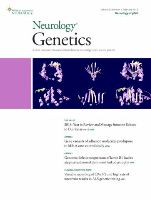
Neurology-Genetics
Exploring Innovations in Neurological and Genetic Science.Neurology-Genetics, an esteemed journal published by LIPPINCOTT WILLIAMS & WILKINS, is at the forefront of advancing the fields of neurology and genetics. With a dedicated Open Access model since 2015, this journal ensures that cutting-edge research is readily available to researchers, professionals, and students worldwide. Operating from the United States, Neurology-Genetics has established a reputable position within the scientific community, as reflected by its impressive rankings in Scopus; it holds a Q1 ranking in clinical neurology and a Q2 ranking in clinical genetics, showcasing its dual commitment to these intertwined fields. With an impact factor that continues to grow alongside its reach, the journal encourages the dissemination of novel findings, innovative methodologies, and critical reviews that contribute to the understanding and treatment of neurological and genetic disorders. Researchers and practitioners are invited to engage with the latest discoveries and discussions, making Neurology-Genetics an essential resource for anyone involved in these dynamic areas of study.

American Journal of Clinical and Experimental Immunology
Connecting Laboratory Breakthroughs with Clinical ImpactWelcome to the American Journal of Clinical and Experimental Immunology, a premier publication dedicated to advancing the fields of clinical and experimental immunology. Published by E-CENTURY PUBLISHING CORP, this journal provides a platform for groundbreaking research, case studies, and comprehensive reviews that contribute to our understanding of the immune system and its implications for health and disease. With a focus on disseminating innovative findings and enhancing the dialogue among researchers, practitioners, and students, the journal aims to bridge the gap between laboratory discoveries and clinical applications. Although specific metrics such as the impact factor and Scopus ranks are currently not provided, the journal is committed to maintaining high standards of scholarly publishing and fostering open access to vital research. Located in Madison, WI, and available online via its E-ISSN 2164-7712, this journal is a valuable resource for those wishing to explore the intricacies of immunological research and its applications in clinical practice.